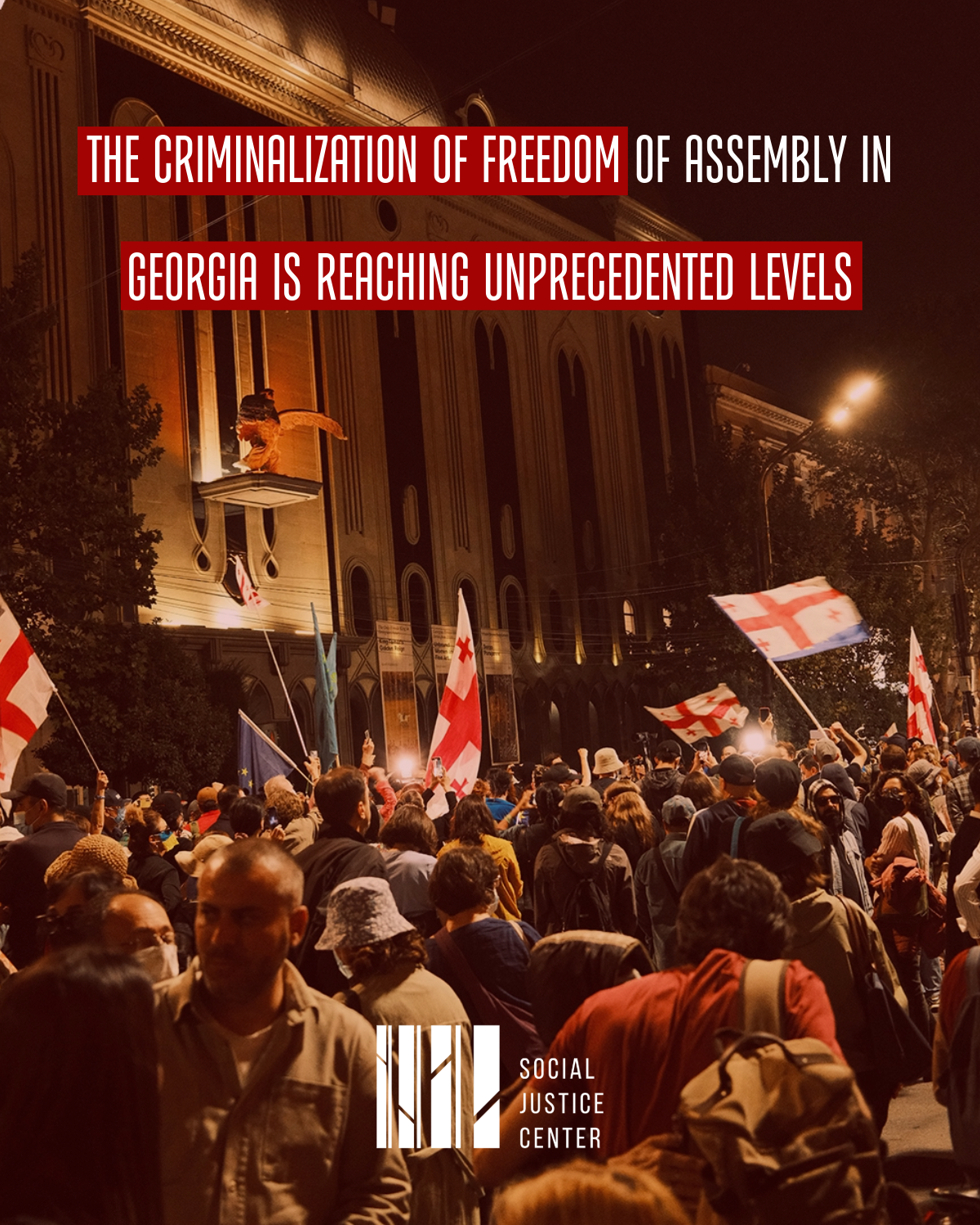საერთო ცხელი ხაზი +995 577 07 05 63


On October 8, 2025, the deputies of the Georgian Dream Party initiated yet another package of legislative amendments restricting the freedom of assembly and expression. The bill is being adopted under an expedited procedure and introduces changes to both the Criminal Code and the Code of Administrative Offenses.[1] The explanatory notes attached to the bills are essentially unsubstantiated and justify the need for amendments only by citing the necessity to establish “proportionate responsibility.”
Under the proposed amendments to the Code of Administrative Offenses (hereafter: CAO),[2] penalties are being toughened for several violations, including:
The proposed amendments to the Criminal Code[8] include:
It is evident that these newly introduced amendments represent yet another step toward suppressing the ongoing protests in Tbilisi and other cities. Two days before the bills were initiated, Irakli Kobakhidze announced the government’s intention to take “methodical and systematic steps” against protest participants and to show “zero empathy toward these people.”[10] The introduction of repressive legislative mechanisms contrary to human rights standards became the first practical step of this “systematic approach.”
Across the country, citizens have been continuously protesting for over 320 days, demanding new parliamentary elections and the release of political prisoners. Against the backdrop of daily demonstrations, over the past ten months the Georgian Dream parliament has repeatedly adopted legislative amendments restricting the freedom of assembly and expression. The amendments of December 13, 2024,[11] February 6, 2025,[12] and July 2, 2025[13] repeatedly increased sanctions for violations related to freedom of assembly and expression and introduced extremely repressive policing mechanisms granting law enforcement practically unrestricted powers over citizens. Notably, all these amendments were adopted within days, through an expedited procedure, in violation of democratic lawmaking principles, without proper explanatory notes, and without participation from the opposition or civil society.
Following the February 6, 2025 amendments, the Venice Commission and OSCE/ODIHR published their opinions on the restrictive legislative changes.[14] Both clearly stated that the increased penalties for violations of assembly regulations are disproportionate and indirectly infringe upon the rights to freedom of assembly and expression. Nevertheless, in recent months, the Georgian Dream parliament has once again toughened the penalties for the same offenses—demonstrating complete disregard for the recommendations and standards of international organizations.
As already noted, under the bill initiated on October 8, 2025, sanctions are being tightened for many offenses that have already undergone multiple rounds of penalty increases in recent months. For instance, until November 28, 2024, occupying a roadway was punishable by a fine of 500 GEL or up to 15 days of detention. The first set of changes quadrupled the fine, while the current bill replaces it entirely with the harshest sanction—administrative detention.
International human rights standards require that criminal sanctions against protest participants or organizers be treated as a measure of last resort, subject to a strict proportionality test. Even where criminal mechanisms are applied, imprisonment must be avoided to the greatest extent possible. Authorities must recognize the importance of assembly both for the individual and for society as a whole.[15]
After several stages of repressive legislative amendments, the initiation of yet another package clearly shows that Georgian Dream is using every means to suppress peaceful protest, opting for punishment methods that rely almost entirely on custodial sanctions against participants. Particularly concerning is the growing trend of using criminal mechanisms—after instrumentalizing the Code of Administrative Offenses—against protesters. The expansion of criminal offenses demonstrates that the ruling party’s goal is to target and punish not only organizers and active participants, but every individual taking part in the protest.
The proposed amendments to the Code of Administrative Offenses and the Criminal Code grossly violate fundamental human rights and serve the political interests of the ruling party rather than any legitimate purpose. In a context where state institutions—especially the judiciary—are fully captured and subordinated to the ruling party’s agenda, and no longer fulfill their function of checks and balances, these repressive laws pose even greater risks and consequences for citizens involved in protest activities.
[1] Publika. Available at: https://cutt.ly/kr93R4mT
[2] Draft Law of Georgia “On Amendments to the Code of Administrative Offenses of Georgia.” Available at: https://cutt.ly/ur93TTgg
[3] Subparagraph “d” of Paragraph 1, Article 1 of the Draft Law.
[4] Law of Georgia on Assemblies and Demonstrations, Article 11, Paragraph 2, Subparagraphs “a” and “b.”
[5] Subparagraph “g” of Paragraph 1, Article 1 of the Draft Law.
[6] Law of Georgia on Assemblies and Demonstrations, Article 11, Paragraph 2, Subparagraph “v.”
[7] Law of Georgia on Assemblies and Demonstrations, Article 11, Paragraph 2, Subparagraph “e”, and Article 111.
[8] Draft Law of Georgia “On Amendments to the Criminal Code of Georgia.” Available at: https://cutt.ly/xr93TSIK
[9] Article 173, Paragraph 3 of the Code of Administrative Offenses of Georgia establishes liability for disobedience or insult by a person subject to administrative penalty toward a representative of a law enforcement agency or another public official.
[10] Publika, 06.10.2025. Available at: https://cutt.ly/ar93OPMa
[11] Social Justice Center. Systemic Analysis of Legislative Amendments Adopted Against Protests, 27.12.2024. Available at: https://cutt.ly/vrTFK0Dh
[12] Social Justice Center. Critical Analysis of the Legislative Amendments Adopted Under Accelerated Procedure by “Georgian Dream”, 13.02.2025. Available at: https://cutt.ly/nrTFJIER
[13] Social Justice Center. Through Repressive Amendments to the Code of Administrative Offenses, “Georgian Dream” Creates Even Easier Conditions for Punishing and Terrorizing Citizens, 02.07.2025. Available at: https://cutt.ly/rr98J1Kv
[14] Institute for Development of Freedom of Information (IDFI). Assessments by the Venice Commission and OSCE/ODIHR on Repressive Amendments Restricting Freedom of Assembly and Expression, 20.03.2025. Available at: https://cutt.ly/lrTF2Avu
[15] Amnesty International. Guidelines on the Right to Freedom of Peaceful Assembly, p. 10.
The website accessibility instruction